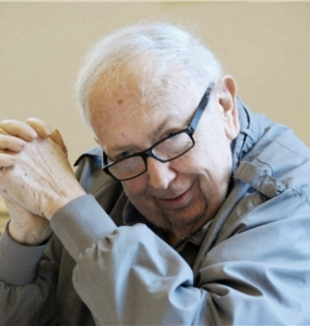
Father Lorenzo and His Capacity for L’eternel
Fried chicken, Elvis Presley, and a Love that has no closure: a friend remembers Lorenzo AlbaceteFather Lorenzo’s signature message on my voicemail (or rather, a few decades ago, on my answering machine that he delivered in person to my freshman dorm room to the great amusement of other students, puzzled at the sight of a rotund priest smoking a cigarette in a non-smoking hallway) usually was a long “Heeeellloooo,” followed by a “Wait a minute, wait a minute” proclaimed in the same tone and cadence as Walter Matthau does in The Sunshine Boys, and then some reference to “L’Eternel.” A mix of friendship, comedy, and the absolute essential in life, the metric of eternity. This was the quintessential Father Lorenzo Albacete.
By training, before being ordained as a priest, Father Lorenzo was a physicist, a bona fide rocket scientist. His mind was well versed in theories, that is, in the human ability to make assumptions, create hypotheses, and test them to see whether our abstract knowledge had a relationship with reality. But that theoretical mindset – however pronounced it was as he explained to me in great detail, for example, why a foggy car windshield required hot air to be cleared of condensation – was always tempered by a clear recognition that we were more than theories or scientists. He never tired of repeating that we are greater than any theory. We cannot be satisfied by all the theories in history. We are, after all, meant for eternity, beyond the capacity of any theory to comprehend or to abstract.
The sign that we were meant for eternity was love. Love for Father Lorenzo was vigorously, on a daily basis, not an abstraction but a concrete act toward concrete individuals. He had an enormous capacity for friendship. Gathering over fried chicken to talk about Grumpy Old Men or Pascal, or in a fountain pen store to admire yet another fine writing utensil, or at Mass was, for him, essential to daily life. And that personal and frequent encounter could never be replaced by just a memory of it or, to use today’s means, by virtual “life.”
Once I saw him just after a shared friend had died. Instead of the somber composure I expected in such a moment, Father Lorenzo was furious. Somebody had mentioned to him that, after this person’s death, we all needed to find “closure.” Well-meaning as this “closure” seeking individual was, for Father Lorenzo he was as wrong as possible. “Closure! What an idiocy!” Love after all has no closure. It does not end with the passing of a loved one. The deceased friend was not a mystical spirit but a person in carne e ossa, irreplaceable, unforgettable, and to be missed painfully forever — or at least until we would meet again in eternity. Father Lorenzo was firm in his belief that love was eternal, a sign of the truth that we are not just bundles of atoms seeking satisfaction to temporal urges.
I can’t do better here than quote Father Lorenzo’s own words of the homily he gave at our wedding mass. He said:
“The love that unites a man and a woman in marriage is the sign of a great mystery. This mystery is engraved in the very structure of our humanity. It is experienced as an unquenchable desire of the human heart. It is a desire that aims at eternity. Indeed the very word ‘desire’ has in its Latin root a reference to the ‘stars,’ – think of what is called ‘sidereal space,’ and of de-siderio. The stars are the symbols of infinity. Love always aims at Infinity, at a limitless Forever.”
He continued the homily with references to Edith Piaf and Elvis Presley. But the point remains: we love and thus aim for Infinity.
With love, with that desire of Infinity, comes also suffering. That desire is, as he put it, unquenchable here and now, and consequently it is a source of suffering. Father Lorenzo was a great teacher of suffering. His physical ailments, no doubt not helped by fried chicken and abundant cigarettes, were a daily burden. And his devotion to his mother, Conchita, and brother, Manuel, was as large as their troubles, and only grew as their plights magnified. I spent countless hours, mostly in wondrous silence with him, visiting his mother. There was no need to speak as there were no answers in face of suffering. As Saint Augustine writes (and Father Lorenzo liked to quote him), we are a “magna quaestio,” a great question, that can find an answer only in God, and silence is preferred to vacuous words incapable of answering that question.
He died ten years ago, but, like other loved ones who passed into eternal life, his presence – not just a memory – continues to accompany me. If only we could have more fried chicken and imitate Walter Matthau again!